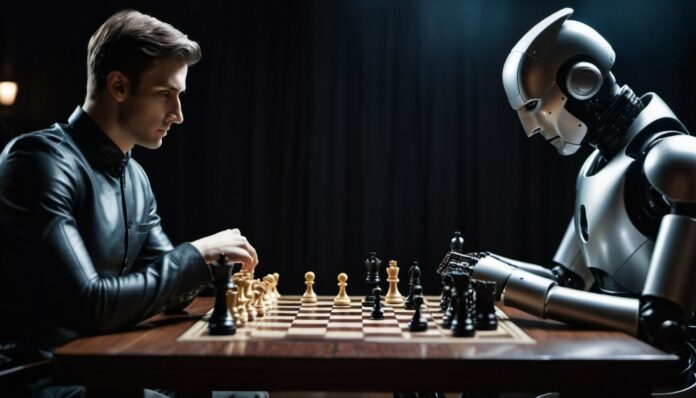The debate about who is more clever, humans or computers, is ongoing. As technology advances, this question becomes even more intriguing. Let’s explore the different aspects of intelligence in humans and computers to understand their strengths and weaknesses.
Chess: The Ultimate Test of Human vs. Computer Intelligence
Chess has long been a battleground for testing the intelligence of humans and computers. This strategic game, with its deep complexities and need for forward-thinking, provides an ideal arena to compare the cognitive abilities of humans and artificial intelligence (AI).
Early Days of Computer Chess
In the early days of computer chess, humans had a clear advantage. The first computer programs, developed in the 1950s and 1960s, were relatively weak and could be easily defeated by skilled human players.
The Birth of Chess Programs
The development of computer chess programs began in earnest in the 1950s, with pioneers like Alan Turing and Claude Shannon laying the groundwork. These early programs could play basic chess but lacked the depth and strategic understanding of human players.
The Rise of AI in Chess
The landscape began to change in the 1980s and 1990s with the advent of more powerful computers and sophisticated algorithms. AI programs started to become serious competitors.
Deep Thought and the First Milestones
Deep Thought, developed by IBM, was one of the first chess computers to make headlines. In 1988, it became the first computer to defeat a grandmaster in a tournament game. This was a significant milestone that showcased the growing power of AI in chess.
Deep Blue vs. Garry Kasparov
The most famous encounter between human and computer in chess history occurred in 1997. IBM’s Deep Blue, an advanced chess computer, faced off against Garry Kasparov, the reigning world chess champion. This highly publicized match marked a turning point.
- 1996 Match: In their first match in 1996, Kasparov defeated Deep Blue, winning 4-2.
- 1997 Rematch: In the rematch in 1997, Deep Blue won 3.5-2.5, becoming the first computer to defeat a world champion in a match.
Comparing Human and Computer Intelligence
Both humans and computers have their unique strengths. Comparing their intelligence involves looking at different aspects where each excels.
Problem-Solving Skills
Humans are better at solving complex, abstract problems that require creativity and intuition. Computers excel at solving structured problems with clear rules and large data sets.
Learning Ability
Humans learn through experience, observation, and interaction. Computers learn through data and algorithms, which is called machine learning. While computers can analyze data faster, humans understand context and nuances better.
The Role of Artificial Intelligence (AI)
Artificial Intelligence (AI) is where computers come closest to mimicking human intelligence. AI systems can learn from data, recognize patterns, and make decisions.
AI has made significant advancements in areas like language translation, image recognition, and even playing complex games like chess and Go. These achievements show that computers can perform tasks once thought to require human intelligence.
Despite these advancements, AI still has limitations. It lacks genuine understanding and consciousness. AI can perform tasks based on data and algorithms but doesn’t possess awareness or emotions like humans.
